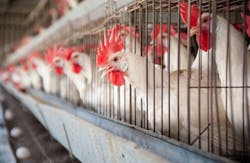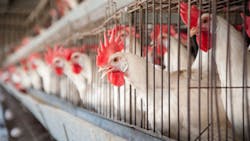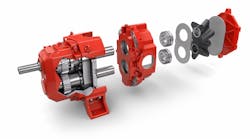The levels of bacteria in broiler chickens being processed at food-processing facilities has been linked to the amount of bacteria found among chickens on farms where they are raised, new research from the University of Georgia reveals.
Scientists looked into the prevalence of bacteria in 55 flocks of chickens on a large poultry farm in Georgia. Results from the study showed that levels of Salmonella and Campylobacter detected on the farm remained unchanged in chicken carcasses reaching processing plants.
According to the U.S. Centers for Disease Control and Prevention, the vast majority of Campylobacter infection in the United States is caused by consuming raw or undercooked poultry. An earlier study from 2011 showed that almost half of all cases of Salmonella linked to undercooked poultry and eggs stemmed from chicken, while a further 17 percent of cases were associated with turkey.
RELATED: Bird flu outbreak costs Chinese poultry industry more than $65 billion
These two types of bacteria are very common in poultry, especially in chicken. Previous studies have claimed that at least half and up to 80 percent of chickens sold in retail food stores are infected with Campylobacter, and approximately 15 percent are contaminated with Salmonella. Separate research from 2010 analyzed 382 chickens purchased from over 100 retail stores in 22 states and detected the presence of Campylobacter in 62 percent of the samples and Salmonella in 14 percent. Almost one in 10 contained both, Food Safety News reports.
While indications of a link between the presence of bacteria on the farm and in poultry have been noted for years, the study from the University of Georgia was the first one to actually look into the amount of bacteria and the way it changes between chickens on the farm and in plants. Results pointed to a direct linear relationship between the two.
RELATED: CDC report reveals increase in some foodborne illnesses
The level of Campylobacter on the farm was a reliable predictor of the amount of bacteria detected in the chickens in processing, with the level generally increasing towards processing. The report published by researchers noted that Campylobacter loads of all farm samples were significantly associated with Campylobacter loads of post-chill carcass rinses.
The study also revealed that of those samples that had Salmonella in processing, the bacteria were present in 96 percent of the samples from farms. For Campylobacter, however, only 71 percent of flocks that were contaminated with bacteria during processing had the bacteria on the farm.
Results from the research highlight the need for prevention of bacteria on farms and raise the issue of better and more advanced methods for prevention. Roy Berghaus, co-author of the study, commented that the incidence of foodborne illnesses would dramatically decline if contamination was more effectively prevented on farms. By contrast, most of the current preventive action is focused on improving sanitary conditions within processing plants.
Salmonella can be effectively treated by applying vaccinations to breeder hens and by treating newly hatched chickens with competitive exclusion products that prevent colonization of pathogenic bacteria. However, there is no effective method to prevent Campylobacter among flocks, researchers noted.



